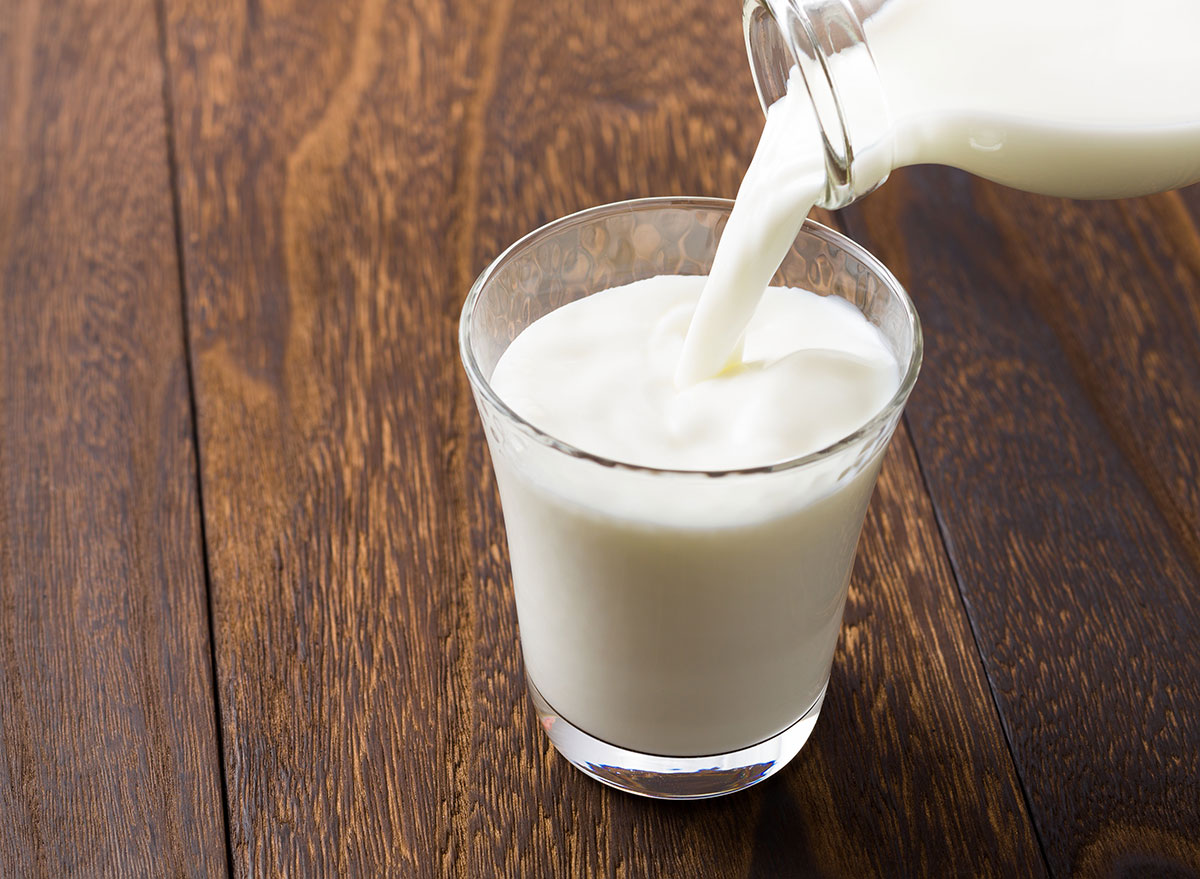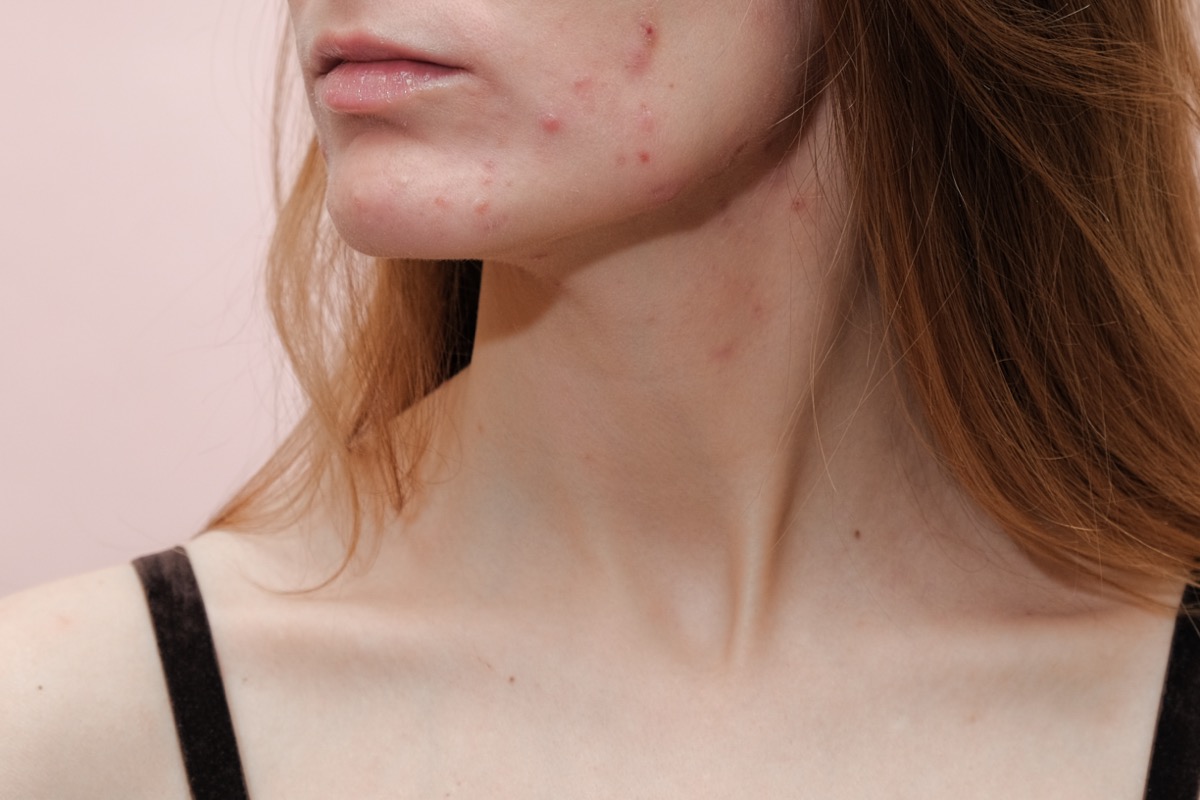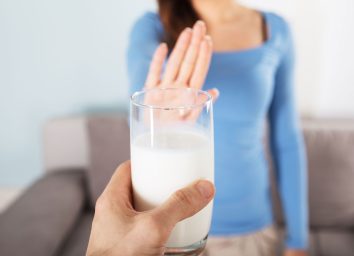Dangerous Side Effects of Drinking Too Much Milk, Say Experts

From the commercials you saw on TV as a kid to your own parents' advice, everyone's heard the long list of health benefits you'll supposedly enjoy if you drink enough milk. However, many experts say that significant milk consumption can actually be detrimental to your health, from exacerbating cardiovascular issues to causing your skin to suffer. If you want to boost your wellbeing, read on to find out what health issues you may be setting yourself up for if you're drinking too much milk. And if you're ready to revamp your diet, start with The 7 Healthiest Foods to Eat Right Now.
You're feeling sluggish.

That glass of milk may add some calories, fat, and vitamins to your diet, but don't expect an energy boost to come along with those nutrients.
"One of the not very well known impacts of milk is that it spikes our glucose levels just like chocolate bars or other sugary treats would," says registered nutritional therapist Sonka Braunová. Instead of feeling energized, you "may get [energy] slumps shortly after" downing a glass of milk, Braunová says.
You suffer frequent bone breaks.

While milk has long been heralded as a means of fighting osteoporosis, research suggests that excessive milk consumption may have the opposite effect.
"Drinking too much milk has led to an increased risk of brittle bones," says Jay Cowin, a registered nutritionist, and director of formulations at ASYSTEM.
In fact, according to a 2014 study published in the BMJ, high milk intake—generally three or more glasses a day—was associated with a higher risk of hip fracture in female study subjects.
And if you want to avoid a serious injury, check out these 15 Things You're Doing That Put You at Risk for Osteoporosis.
You're breaking out.

Those rumors you heard in high school about certain foods causing breakouts may have a grain of truth to them.
"Dairy increases the occurrence and severity of acne and eczema," says Trista Best, a registered dietician at Balance One Supplements. "Dairy leads to an overproduction of mucus in the body which results in a greater amount of oil on the skin, primarily the face. This, along with the inflammatory nature of dairy, create a perfect combination for painful and embarrassing acne flare-ups."
And to discover which other foods are conspiring against your complexion, check out these 10 Foods Making Your Acne Even Worse.
Your heart health is suffering.

If you want to keep your heart healthy, you may want to moderate your intake of milk—especially the full-fat kind.
"Consuming too much milk and other dairy products can clog your arteries. Also, milk contains cholesterol which increases the risk of cardiovascular diseases," says certified nutritionist Jennifer Lima of Mango Clinic.
According to a 2016 study published in the American Journal of Clinical Nutrition, replacing 5% of a person's daily intake of dairy fat with the same amount of polyunsaturated fatty acid or vegetable fat reduced their risk of cardiovascular disease by 24 and 10 percent, respectively. And if you're thinking of ditching the dairy in your diet, check out The Best and Worst Milks & Milk Alternatives.
You have insulin resistance.

Insulin resistance—a condition marked by your body's inability to efficiently extract glucose from you blood, and which may be a precursor to diabetes—may be associated with higher dairy intake.
"Dairy products are highly insulinogenic, which can lead to insulin resistance," says Piper Gibson, a board-certified doctor of natural medicine and holistic nutrition, certified functional diagnostic nutrition practitioner, and corporate clinical educator for GX Sciences. "Milk and dairy products influence the release of insulin even though it isn't high in sugar."
According to a 2012 study published in the Journal of Diabetes Research, women who consumed the most dairy were significantly more likely to develop insulin resistance than those with moderate to low dairy intakes.
You catch every bug going around.

If you're catching every cold being passed around your home or office, you might want to reevaluate your dairy consumption.
Dairy products can cause systemic inflammation, says nurse practitioner Tiffany Allen, FNP-C, WHNP-BC, founder of Triad Lifestyle Medicine. "Chronic inflammation can also lead to an unhealthy gut, which can affect not only gastrointestinal conditions, but also immune function, [because] 70% of our immune system lives in our gut," Allen explains.
You have frequent digestive issues.

Those persistent gastrointestinal problems you've been suffering and your dairy consumption may be more closely related than you realize.
"Consuming too much milk can make you feel bloated…it will disturb your overall body while leading to gastrointestinal issues," says Amber O'Brien, MD, of Mango Clinic.
Your memory is suffering.

If you're eager to keep your memory sharp, you may want to reconsider how much milk you're drinking on a daily basis.
According to O'Brien, adults who are drinking too much milk "are more likely to fail tests than those who do not drink milk or drink less than two glasses every day."
In fact, a 2017 study published in the journal Nutrients found that adults who drank more than one glass of milk a day experienced a 10% greater cognitive decline over a 20-year period than those who said that they had limited to no milk consumption.
If you're eager to give your brain a boost, check out these 21 Tips That Improve Your Memory, According to Doctors.








